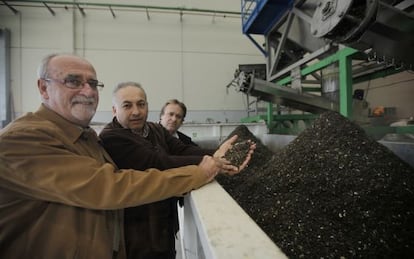The town that cooks the trash
The municipality of Rivas Vaciamadrid is looking to export a technology that reduces waste by 70 percent But environmentalists oppose it


It should smell of rotting, but instead you get the slight whiff of stew. No, grandma isn't cooking, nor are there carrots, bacon or chick peas on the boil. Well, in reality, there are. But they are accompanied by cans, plastic bottles, leaves, fruit peelings... In short: garbage. Tons of waste that scores of trucks collect in the municipality of Rivas Vaciamadrid on the outskirts of Madrid, and take to the pilot plant that is testing a new technology to do away with the problem of overflowing and polluting garbage dumps. The idea is to boil, sterilize and use close to 100 percent of the waste for creating energy. Or at least that is what its promoters say. They call it Vertedero 0 (Landfill 0) and it has attracted interest from China, Brazil and Chile. But it has also raised opposition from environmentalists, who warn that the plant breaches European waste-management regulations.
What to do with the garbage generated by society is one of the problems that has town halls and governments scratching their heads. It is costing them more and more to extend the life of landfill sites, while incineration has turned out to be a disastrous solution for the environment due to emissions.
At the very least, we are already extending the life of garbage dumps"
The project began in 2010 when RivaMadrid, the company responsible for collecting municipal solid waste (MSW) in the area, signed an agreement with Aragonese firm Ecohispánica to develop the technology. A pilot plant has been operating in the municipality for the last year. "I don't know whether it is because it is mine, but I think this is the best business of the 21st century," says Jesús Marco Solórzano, managing director of Ecohispánica. "Being able to say that landfill sites might disappear is very significant. Either we do something about the garbage or it will eat us up."
First of all, a battalion of 12 trucks trawls the town, loading up the containers it comes across. Only the bags of remains reach the plant, which are unloaded into a ditch to be ground up while a computer system takes data readings. A giant hook is responsible for stirring the mass around. The smell at this point in the process is unbearable.
Biogas and diesel
Environmentalists have set their sights on Vertedero 0. They don't like it, saying it is unsustainable both environmentally and economically.
"Apart from the metal remains, nothing of what is obtained after the treatment is reusable," explain Friends of the Earth, Ecologists in Action and Greenpeace. "The different types of plastic end up mixed up, which makes their separation very difficult, and the sterilized organic material cannot be converted into fertilizer."
José Gómez, manager of RivaMadrid, the public company responsible for collecting solid waste, attacked the environmentalists, saying they form part of an evaluation committee that "they have barely attended," and so what they say "has little to do with reality."
Ecohispánica explains that the organic waste may not be suitable for compost, but it is suitable for other ends, highlighting its use for the production of biogas and fuel gas. With the right technology, it says, diesel oil could be produced with the plastic.
Once mashed up, the remains pass along a conveyor belt that takes it to the waste cleaner, "the heart of the plant." It is a kind of huge silver cistern that acts like a cooking pot, with high-temperature water vapor and changes in pressure that, after a half-hour process, sterilizes the remains and reduces their volume by 70 percent. "With this alone we would already be extending the life of garbage dumps," notes Solórzano. The steam is generated by a boiler, though Ecohispánica says that with the right technology they would be able to be energetically self-sufficient by using the remains.
From here the smell of rotting disappears, giving way to one reminiscent of grandma's stew, though slightly less appetizing. You can now touch the waste — no masks or other precautions are needed to handle it. The organic material, which is the most polluting because of the methane it emits, is isolated just after passing through the water cleaner. Leachates — liquids that come out of the waste, and that are expensive to treat — are avoided by extracting the fluid from the trash along with the condensed vapor. The water can be purified by reusing it in the process, explains Solórzano, who seems to have an answer for everything.
The rest of the materials, now minus the organic matter, are separated using an electromagnet (for ferrous metals), a group of Eddy current separators (aluminum), an optical separator (plastic) and a final manual separation to definitively isolate the 15 percent of inert material that is not usable after the treatment. The Rivas plant does not yet have the technology needed for this separation or to later use the matter to create energy, which for the moment are just plans.
Working on these is local mayor José Masa, of the United Left, in order to try to export the idea to other cities and countries, although he rules out patenting it for the moment. "They are not only interested in the economic aspect — because this technology is two-thirds cheaper than traditional landfill — but also its environmental sustainability," Masa says.
The big question, though, is why he has ruled out establishing an industrialized plant in his municipality if everything is as good as it looks. "The plan is for the system to serve a population volume that is more like a group of communities," Masa replies. An answer that even sounds reasonable to his political adversaries.
Tu suscripción se está usando en otro dispositivo
¿Quieres añadir otro usuario a tu suscripción?
Si continúas leyendo en este dispositivo, no se podrá leer en el otro.
FlechaTu suscripción se está usando en otro dispositivo y solo puedes acceder a EL PAÍS desde un dispositivo a la vez.
Si quieres compartir tu cuenta, cambia tu suscripción a la modalidad Premium, así podrás añadir otro usuario. Cada uno accederá con su propia cuenta de email, lo que os permitirá personalizar vuestra experiencia en EL PAÍS.
¿Tienes una suscripción de empresa? Accede aquí para contratar más cuentas.
En el caso de no saber quién está usando tu cuenta, te recomendamos cambiar tu contraseña aquí.
Si decides continuar compartiendo tu cuenta, este mensaje se mostrará en tu dispositivo y en el de la otra persona que está usando tu cuenta de forma indefinida, afectando a tu experiencia de lectura. Puedes consultar aquí los términos y condiciones de la suscripción digital.








































